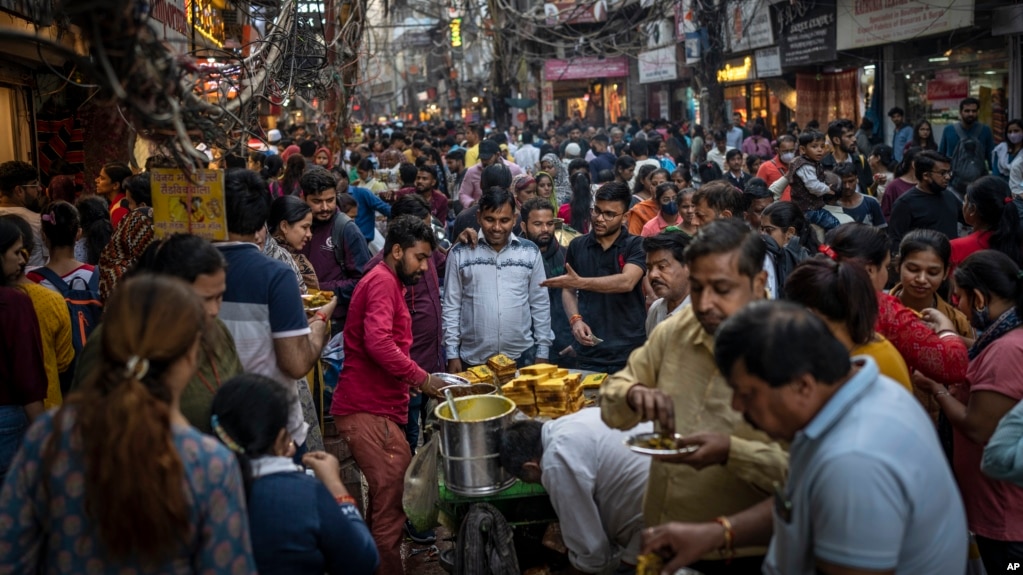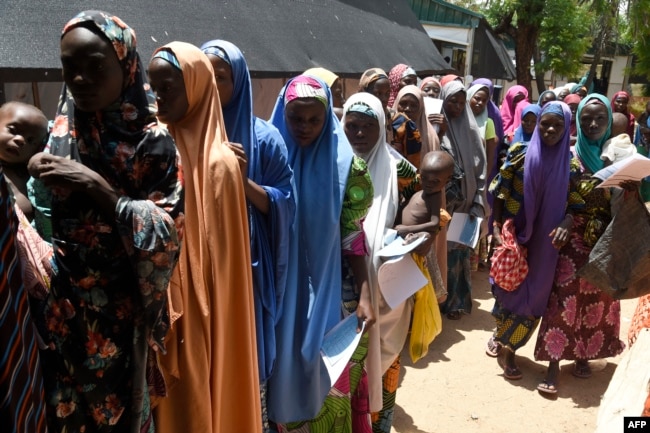World Population Hits 8 Billion, Creating Many Challenges

A United Nations report projects the world’s population hit an estimated 8 billion people on Tuesday. Much of the growth comes from developing nations in Africa.
The U.N.’s Day of 8 Billion on Tuesday is more representative than exact, officials note.
The report was released this summer and included other predictions, as well. It projected the world’s population will reach around 8.5 billion in 2030, 9.7 billion in 2050, and 10.4 billion in 2100.
The report found that the population in many countries in sub-Saharan Africa is predicted to double between 2022 and 2050. Such a population increase, the report said, will put “additional pressure on already strained resources and challenging polices aimed at reducing poverty and inequalities.”
In Nigeria, resources are already stretched to the limit. More than 15 million people in the country’s biggest city, Lagos, compete for everything from electricity to light their homes to seats on crowded buses.
The U.N. says that over the next 30 years, Nigeria’s population is expected to increase from 216 million to 375 million. That would make Nigeria the fourth-most populous country in the world after India, China, and the United States.
“We are already overstretching what we have — the housing, roads, the hospitals, schools. Everything is overstretched,” said Gyang Dalyop. He advises in city planning and development in Nigeria.
Increasing populations threaten to leave behind even more people in developing countries. Governments will struggle to provide enough classrooms and jobs for a quickly growing number of young people. And food insecurities will become an even more urgent problem.
Nigeria is among eight countries the U.N. says will account for more than half the world’s population growth between now and 2050. Other African countries included in that group are Congo, Ethiopia and Tanzania.
The other countries with the fastest growing populations are Egypt, Pakistan, the Philippines and India. India is set to overtake China as the world’s most populous nation next year.

FILE - Mothers queue to be attended to with children that are suffering malnutrition in a clinic set up by health authorities in collaboraion with Medecins Sans Frontieres or Doctors Without Borders (MSF)in Katsina State, northwest Nigeria, on July 20, 2022. (Photo by PIUS UTOMI EKPEI / AFP)
Fast population growth also means more people competing for water resources and food, as climate change increasingly affects crop production.
“There is also a greater pressure on the environment, increasing the challenges to food security that is also compounded by climate change,” said Dr. Srinath Reddy. He is president of the Public Health Foundation of India.
Still, experts say the bigger threat to the environment is consumption, which is highest in developed countries not undergoing big population increases. Consumption means the use of something, such as fuel.
Poonam Muttreja is executive director of the Population Foundation of India. She said, “Over the past 25 years, the richest 10 percent of the global population has been responsible for more than half of all carbon emissions.”
Growing Africa
The U.N. says the population in sub-Saharan Africa is growing at a rate of 2.5 percent each year. That is more than three times the world average. Women in sub-Saharan Africa on average have 4.6 births. That is two times the current world average of 2.3.
The U.N. said that any effort to reduce family size now would come too late to effectively slow the 2050 growth projections.
Slowing growth in other parts of the world
Even as populations increase in some countries, the U.N. says rates are expected to drop by one percent or more in 61 nations.
The U.S. population is now around 333 million, according to data from the U.S. Census Bureau. The population growth rate in 2021 was just 0.1 percent, the lowest since the country was founded.
“Going forward, we’re going to have slower growth — the question is, how slow?” said William Frey. He is an expert in human population changes at the Brookings Institution. “The real wild card for the U.S. and many other developed countries is immigration.”
Consumption
Charles Kenny is a senior expert at the Center for Global Development in Washington. He said environmental concerns surrounding the 8 billion estimate should bring attention to consumption, especially in developed countries.
He said, “Population is not the problem, the way we consume is the problem.”
Words in This Story
strained – adj. feeling or showing the effect of too much work, use, or effort
challenge – v. to test the ability, skill, or strength of (someone or something
poverty – n. the state of being poor
consumption – n. the amount of something that someone uses, eats or drinks
global – adj. involving the entire world
emissions – n. the act of producing or sending out something (such as energy or gas) from a source
wild card – n. a person or thing that could affect a situation in a way that cannot be predicted: an unknown or unpredictable factor
http://lms.brentphone.kr/board/newspaper_write2.asp?mcl=&opt_gubun=title&opt_wrd=&opt_lang=1&job=N